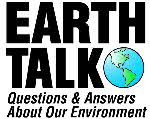Cattle and Methane GasEARTH TALK
January 2006 Dear EarthTalk: Someone told me that methane gas emitted by cows is a major contributor to global warming. I thought it was a joke, but is this true? -- David Rietz, Goose Creek, SC Accumulation of methane in the Earth’s atmosphere has nearly doubled around the globe over the past 200 years. Scientists believe that rising concentrations of this “greenhouse gas,” which absorbs and sends infrared radiation to the Earth, are causing changes in the climate and contributing to global warming.
Livestock animals naturally produce methane as part of their digestive process, belching it while chewing cud and excreting it in their waste. According to the Worldwatch Institute, about 15 to 20 percent of global methane emissions come from livestock. John Robbins, author of The Food Revolution and Diet for a New America, says that methane is 24 times more potent a greenhouse gas than carbon dioxide, the culprit normally at the center of global warming discussions.
And there are plenty of sources of it: The United States Department of Agriculture (USDA) reports that animals in the U.S. meat industry produce 61 million tons of waste each year, which is 130 times the volume of human waste produced, or five tons for every U.S. citizen. In addition to its impact on climate, hog, chicken and cow waste has polluted some 35,000 miles of rivers in 22 states and contaminated groundwater in 17 states, according to the U.S. Environmental Protection Agency.
Ronnie Cummins, national director of the Organic Consumers Association, says that a food chain with meat at its top is unsustainable not only as a major contributor of greenhouse gases, but also with regard to inefficient dedication of large amounts of acreage to livestock grazing. The USDA, for example, says that growing the crops necessary to feed farmed animals requires nearly 80 percent of America’s agricultural land and half of its water supply.
In addition, animals raised for food in the U.S. consume 90 percent of the country’s soy crop, 80 percent of its corn crop, and 70 percent of its grain. “If all the grain currently fed to livestock in the United States were consumed directly by people, the number of people who could be fed would be nearly 800 million,” says Cornell ecologist David Pimentel. He adds that irresponsible livestock farming is directly or indirectly responsible for much of the soil erosion in the U.S.
Unfortunately, environmental problems associated with livestock rearing are not limited to the United States. According to the international environmental journal, Earth Times, meat production grew more than fivefold worldwide during the latter half of the 20th century. And as intensive “factory” farming methods of raising livestock spread from the U.S. to other countries--many with regulatory monitoring and enforcement standards far worse than our own--this form of pollution is sure to play an increasingly larger role in environmental problems moving forward.  CONTACTS: Organic Consumers Association, (www.purefood.org); Worldwatch Institute, (www.worldwatch.org) CONTACTS: Organic Consumers Association, (www.purefood.org); Worldwatch Institute, (www.worldwatch.org)
GOT AN ENVIRONMENTAL QUESTION? Send it to: EarthTalk, c/o E/The Environmental Magazine, P.O. Box 5098, Westport, CT 06881 USA; e-mail: earthtalk@emagazine.com . | 